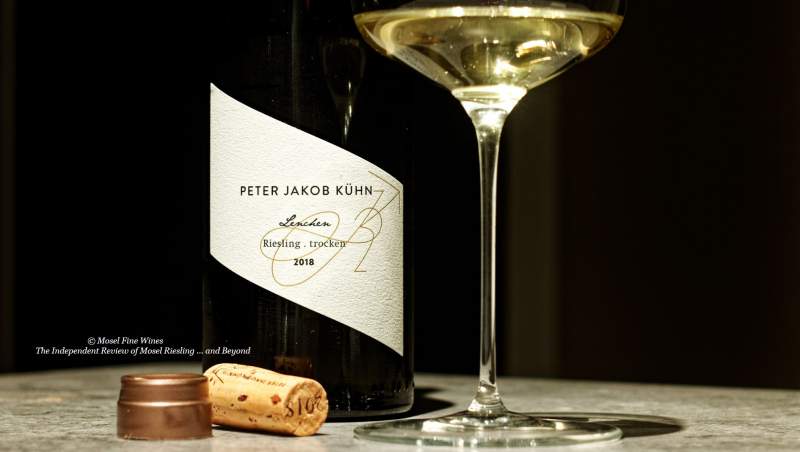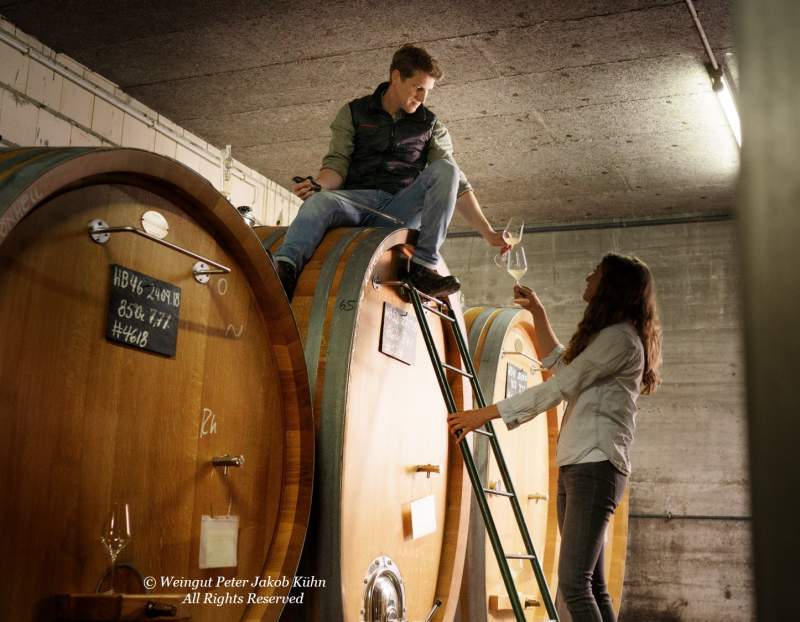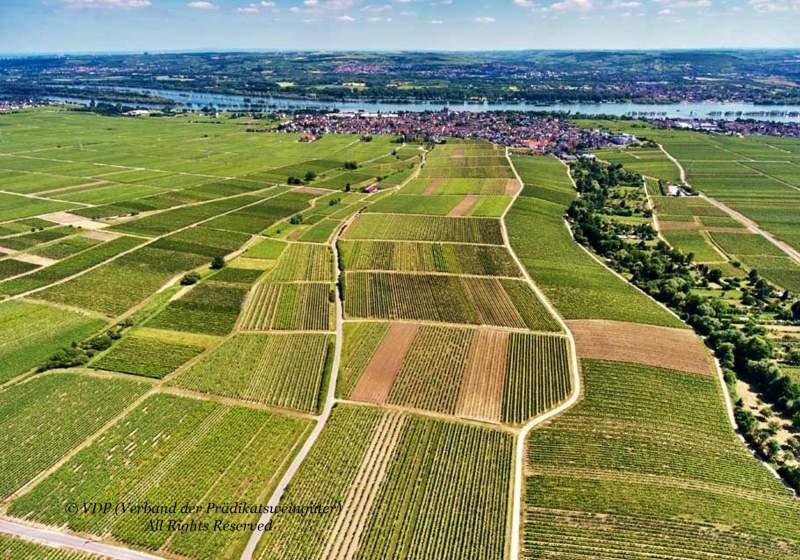December 1, 2020 | News | Issue Highlights

This GG proved a highlight of our annual dry German Riesling report. Here some background on a stunning wine by a remarkable grower.


Our 2019 dry German Riesling Report underlined the fact that 2019 was not an easy vintage for dry Riesling in Germany but that greatness was possible.
The report also underlined the increasingly stunning quality of the late-released dry Riesling from previous vintages. More and more growers delay the release of some of their finest dry Riesling by a year or two. And these wines are now among the finest on the market. Among these, the 2018er Lenchen GG by Peter-Jakob Kühn proves a true highlight.
Weingut Peter Jakob Kühn is one of the most individualistic Estates in the world of fine Riesling. It is not one of the grand Estates which graced already the tables of the rich and famous with Hock around 1900: The Kühn family looks back at a lineage of “humble” wine growers who worked the earth and, as was usual at the period, sold the result to the trade.
It is one of the first Estates to embrace biodynamic principles in the region. As Peter Bernard Kühn explained: “My father, Peter Jakob, is quite a reflective person who does not take things for granted. He started to question the way vineyards were worked intensively back in the 1980s and 1990s and gradually introduced farming methods more in sync with nature. In 2004, he then took the then rather unheard and bold step of getting certified to organic and biodynamic farming.”
Peter Bernhard got into wine as a consequence of this move: “For much of my youth, I wasn’t seeing myself in wine and had already started studies in journalism, when my father got me immersed into the thinking about organic and biodynamic winemaking when the Estate did the transition. Suddenly, wine was getting interesting, individualistic, and less predictable. Working together with nature is something which truly appeals to me. It brings out the specifics of each vineyard so much better.” He consequently started winemaking studies at the Geisenheim University.
The Estate wants to retain a human nature: "We were offered quite some prime parcels lately so we had increased our size. But we have downsized slightly afterwards to bring the Estate's size back to 20 ha. We want to remain at a manageable size without business requirements taking over."

After a enlightning stint at Zind-Humbrecht (Alsace, France) in 2012, Peter Bernhard Kühn joined the Estate full-time together with his wife Viktoria and started, in his words, to rethink the whole approach. One aspect emerged after a cask had not yet cleared itself after 12 months: "Our wines all ferment naturally so we decided to leave this cask alone and give some more time. The result was so satisfactory that we decided to apply the same for all our top dry Riesling (GGs) as of 2013. I find that this adds so much depth to our wines.” Hence, the GGs are usually bottled after approx. 18 months and released two years after the vintage.
We feel that since 2013-2014, the Estate has made a further quantum leap in quality. However, the fact that the wines are left for quite a while on their lees without intervention may add a distinctive and seemingly “oxidative” touch akin to baked apple in their youth. This touch does however blow away with age. The wines then regain a sense of freshness, seemingly “out of nowhere” (we have experienced the same with many wines made with little intervention).
The home turf of the Estate is Oestrich and it is not surprising that the Oestricher Lenchen is one of its flagship vineyards. The original part of this vineyard is on a gentle west-facing slope towards a small brook.
As Peter Bernhard Kühn reported, they only recently envisaged to use some fruit in their Lenchen parcels for dry wines: “Historically, the presence of the brook and the closeness to the Rhine meant that the vineyard was prone to autumnal mist and the development of botrytis, i.e. ideal conditions for great sweet wines. However, with the climate change, we now harvest our fruit in late summer rather than autumn, i.e. well before any botrytis can develop.”
2018 would be the first vintage for such a GG: “We had a particular eye on a site close to the brook, with a particularly high content of iron and which was planted in 1964. Unfortunately, the low yields of 2016 and 2017 crossed our plans in those vintages but 2018 proved ideal for this and we were able to harvest a full cask.”

Overall, the 2018 vintage proved quite soothing for the Estate: “We had been hit hard by low yields in both 2016 (due to peronospora) and in 2017 (due to hail), so we were a bit worried as 2018 started early. Fortunately, no frost developed and the whole season developed rapidly. There was drought but this is less of an issue in our neck of the world given the deep topsoil of loess loam in our vineyards. The key to the success was to accept the rapid development in the vineyards and adapt harvest accordingly. We started our main Riesling harvest already by early September and this allowed us to retain some freshness in our grapes.”
The 2018er Lenchen GG was made along the now well-practiced approach of the Estate. The grapes did not undergo any pre-fermentation cold soak. Instead, the whole bunches of grapes were pressed slowly at low pressure before the must being roughly separated from the solids via an overnight sedimentation. The wines are then transferred into mostly old casks and fermented and aged for 18 months.
This debut vintage for the Lenchen GG is a stunning success. The wine proves a triumph of finesse, subtlety, and elegance. Unfortunately, only a small amount was produced but worry not: Overall, the Peter Jakob Kühn Estate nailed the 2018 vintage, as we found out during our tastings. All its four GGs are among the finest of the vintage.
Happy hunting!
The stunning collection of 2018er GGs by Peter Jakob Kühn
was reviewed in the Mosel Fine Wines Issue No 54 (Oct 2020).
You are a subscriber and miss this Issue?
Simply send us a request by
email
and we will be happy to send you a copy.
You are not yet a subscriber and wish to get this Issue?
Subscribe free of charge by registering yourself here below and ask us for a copy by email.
2018er
Peter Jakob Kühn
Oestricher Lenchen Riesling Trocken GG
25 20
96+
The 2018er Lenchen Riesling Trocken, as it is referred to on the consumer label, offers a captivating, complex, and quite breathtaking nose of smoke, candied grapefruit, thyme, cassis, lanoline, ginger, and almond cream. The wine proves hugely playful on the spicy and herbal palate. A touch of marzipan and candied citrusy fruits adds layers of presence and ripeness, yet the wine manages to keep a great refreshing side right into the stunningly long and intense finish. It is still compact, especially given its huge feel of density and high level of dry extracts. This stunning dry Riesling may even exceed our already remarkably high expectations if it manages to maintain its great level of freshness while showing even more depth and complexity. 2025-2043+
© Text by Mosel Fine Wines "The Independent Review of Mosel Riesling ... and beyond!"
Disclaimer: Mosel Fine Wines is an independent publication and has no commercial relationship with any Estate, association or organization featured in this article.